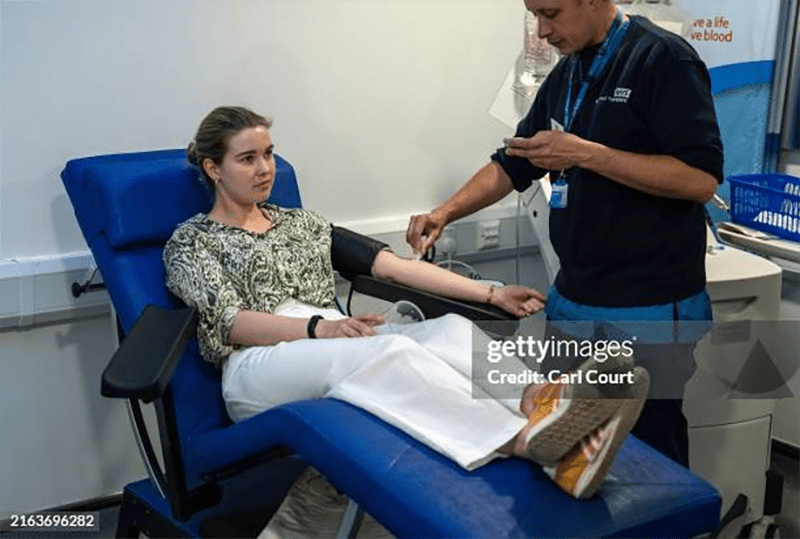To determine whether a patient has or risks developing certain diseases, doctors will usually take various measurements like blood cell counts and cholesterol levels and examine their clinical history. While these tests are highly effective in detecting numerous common diseases, they’re less so for rarer conditions like pulmonary fibrosis and non-Hodgkin’s lymphoma. The lack of predictive blood tests for these diseases can delay the diagnosis and treatment of them.
There’s good news on the horizon for patients who have these rarer diseases. In a recent study of over 40,000 blood samples from patients with various pathological diseases, researchers from the United Kingdom and Germany pinpointed various protein signatures that accurately predicted or detected the presence of 67 of those diseases. The study’s results suggest that a new blood test that searches for these signatures could be more effective at identifying these diseases than current clinical methods are.
How The Researchers Conducted The Study
Researchers from the Berlin Institute of Health at Charité, University College London, Queen Mary University of London, University of Cambridge, and the pharmaceutical company conducted the study and published their results in the journal Nature Medicine on July 22. The team gathered two sets of data that could be used to predict the onset of diseases in patients: traditionally collected clinical measures for and blood plasma from those patients.
The researchers collected the clinical and blood plasma data from a randomly selected subset of more than 40,000 participants in the UK’s BioBank PharmaProteomics (UBB-PPP) study. All the patients in this subset had been diagnosed with collectively diagnosed with 218 pathologically diverse diseases, including multiple myeloma, motor neuron disease, and dilated cardiomyopathy.
The researchers first reviewed the clinical data they collected from patients, which included their age, sex, body mass index (BMI), self-reported ethnicity and parental history, smoking status, and alcohol consumption. Then they ran proteomic analyses on over 3,000 proteins in the blood plasma from these patients since the structure and function of proteins in the human body can be used to detect the existence and spread of diseases. Finally, they compared the results of these methods to determine how effective they both were at predicting the development of various common and rare diseases.
How The Protein Test Compared With Standard Clinical Tests
https://gty.im/1231224718
After analyzing the plasma proteins contained in a single drop of blood from each patient, the researchers pinpointed several protein “signatures,” or combinations of 5 to 20 proteins, that were most relevant in predicting at least 67 of the 218 diseases diagnosed in those patients. Among these diseases those signatures could predict were non-Hodgkin’s lymphoma, celiac disease, pulmonary fibrosis, motor neuron disease, multiple myeloma, dilated myocardiopathy, blood cancers, degenerative nerve diseases, and heart failure.
Compared to other standard tests that predict diseases by measuring blood cell counts, blood sugar levels, kidney function, and cholesterol levels, the analysis of these protein signatures were significantly more effective at identifying a patient’s risk of having or developing these diseases. While the standard clinical models had a 25% median detection rate for these 67 diseases, the protein signature blood test had a 45.5% median detection rate with a 10% false positive rate.
What These Results Mean For The Future Of Blood Tests
Though the researchers have stated they need and are planning to validate their findings among different groups of people, including those from different ethnic groups and with varying levels of symptoms for different diseases, they expressed much enthusiasm about the study’s results. Since many rare diseases like celiac disease often require invasive testing to properly diagnose them, a test like this one that only requires a single drop of blood to detect these types of diseases presents the possibility of a less invasive way to diagnose those diseases.
In many cases, rare but severe diseases like multiple myeloma and idiopathic pulmonary fibrosis can take months or years to diagnose properly. This new test could help doctors detect, treat, or help prevent these severe conditions much earlier than they usually can now, thus improving the prognosis for patients who have them. The researchers also predict that the protein signature blood tests could also allow scientists to study hundreds of diseases at a time so they can better research and develop new medicines and identify which patients would benefit most from them.
Final Thoughts
Diagnosing diseases early on and accurately is highly beneficial for ensuring effective treatment and better prognoses. While various standard clinical methods are effective for testing patients for the presence and risk of common diseases, those methods aren’t quite as effective identifying rarer diseases. In fact, diagnosing several kinds of rarer diseases can require more invasive methods and longer wait times to prove successful.
Thankfully, British and German researchers have recently shown the effectiveness of a test that requires only one drop of blood to detect the presence or risk of a wide range of common and rare diseases. In some ways, this new test is better than standard clinical methods in identifying these diseases. While more testing needs to be done to determine its effectiveness on a broader range of patients, this test could help many patients get more quickly and accurately diagnosed and treated for rare yet severe diseases.
Disclaimer: This article is intended simply to provide information. It does not replace the medical advice of a physician. Please speak with your doctor if you have any questions or concerns.
For More Great Content
Total Apex is an all-encompassing content producer. We provide heavily detailed articles every day on entertainment, gaming, sports, and so much more! Check out all our great entertainment content at Total Apex Entertainment. Check us out on X @TotalApexSports and our other sites: Total Apex Sports, Total Apex Sports Bets, and Total Apex Fantasy Sports.










